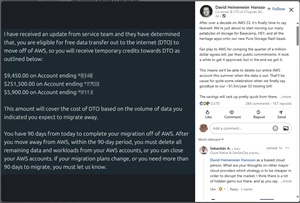News
Cloud Data Egress Fee Tussle Plays Out with $250k AWS Comp
Cloud data egress fees became a big issue when some organizations who embraced cloud computing changed their minds and found out it might cost them a lot of money to take their data and park it on-premises.
In response to increased industry and regulatory pressure, all three cloud giants have implemented -- to varying degrees -- some type of program to waive these fees when orgs choose to take their data and leave. This all happened fairly recently (see the March 2024 article, "Microsoft Is Final Cloud Giant to Kill Data Egress Fee").
This week, the issue was framed in a LinkedIn post from David Heinemeier Hansson, co-owner & CTO of web software company 37signals, known for its Basecamp and HEY offerings.
"Fair play to AWS for comping the quarter of a million-dollar egress bill, per their public commitments," he said. "It took a while to get it approved, but in the end we got it."
 [Click on image for larger view.] 'Fair Play to AWS' (source: LinkedIn).
[Click on image for larger view.] 'Fair Play to AWS' (source: LinkedIn).
He has been vocal in trumpeting savings to be seen from going on-premises, charting the company's initiative in LinkedIn posts like one some six months ago when a reader asked, "How much is the horrrendous egress charge going to be to exit S3?"
In reply, just like he did in this week's post, Hansson simply pointed to March 2024 AWS documentation, "Free data transfer out to internet when moving out of AWS."
In this week's post, another reader said: "EU Data Act (Article 34) currently demands that egress fees be no larger than the actual cost incurred by the CSP. AWS is not doing this out of their own hearts. And from 2027 Jan 12, they will not be allowed to charge any fees."
Another comment read: "Yes, every cloud provider is obliged to do that. But only when you shut down and migrate to a different solution."
Those comments, however, don't fully explain a complex situation. Basically, AWS was not legally required by the EU Data Act to waive 37signals' fees, but did so as part of a broader, policy-driven response to new regulations. The EU Data Act mandates that data egress fees for EU customers be cost-based only, with a complete ban on profit-generating egress fees by Jan. 12, 2027.
AWS explained more about its stance in another post published in conjunction with the one above, "Promoting customer choice: AWS takes another step to lower costs for customers changing IT providers."
In that post, AWS announced that it will waive data transfer out (egress) fees for customers leaving its platform -- provided they meet specific conditions -- framing the move as part of its commitment to interoperability, transparency, and customer choice. The post positioned AWS's new egress fee waiver as a move to support customer choice and interoperability, without referencing specific regulations or industry initiatives. Meanwhile, other industry efforts -- such as the Data Transfer Initiative championed by Apple, Google, Meta and others, aims to make data transfer easier, safer, and more reliable for users and organizations, allowing them to switch platforms or services with minimal friction.
As far as general savings from going on-premises from the AWS cloud, Hansson said 37signals expects to save $1.5 million per year on storage alone by moving off of AWS S3.
What's more:
The savings will rack up pretty quick from there, once we've amortized the $1.5m outlay on the combined 18 petabytes of capacity we've bought from Pure across our two data centers. After that, the yearly cost will be below $200,000. Much easier to swallow than $1.5m/year!
That'll conclude compressing our yearly infrastructure bill from the $3.2 million we started with to well under a million. So two+ million dollars in savings kicking in every year from there. All operated by the same team as before.
Cloud can be a good choice in certain circumstances, but the industry pulled a fast one convincing everyone it's the only way.
No wonder you see cloud vendors and ads and PR everywhere. There's so much money in convincing everyone that owning your own hardware is impossible or that operating Linux servers is too hard!
Note that data egress fee structures vary from provider to provider. Microsoft Azure documentation says: "Azure offers free egress for customers leaving Azure when taking their data out of the Azure infrastructure via the internet to switch to another cloud provider or an on-premises data center. Azure already offers the first 100 GB/month of egressed data for free to all customers in all Azure regions around the world (see Internet Egress table above). If you need to egress more than 100 GB/month, please follow these steps to claim your credit."
Google, meanwhile, in January 2024 published, "Cloud switching just got easier: Removing data transfer fees when moving off Google Cloud."
It announced Google would eliminate data transfer (egress) fees for customers migrating all their data off its platform, allowing them to move to another cloud provider or on-premises infrastructure without incurring these charges. This policy, available globally, was framed as being part of Google's commitment to customer choice and openness and was positioned as a response to concerns about cloud vendor lock-in.
In summary, claims that hyperscalers eliminated data egress fees in the face of regulatory pressures might have some tenuous merit, but programs like the one implemented by AWS were not required by the EU Data Act or any other specific regulations. Community note served.
About the Author
David Ramel is an editor and writer at Converge 360.